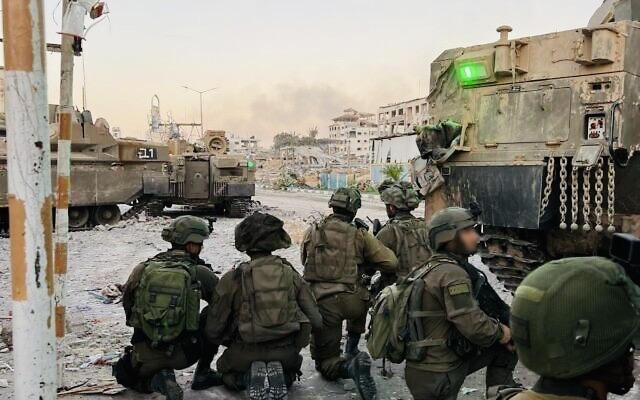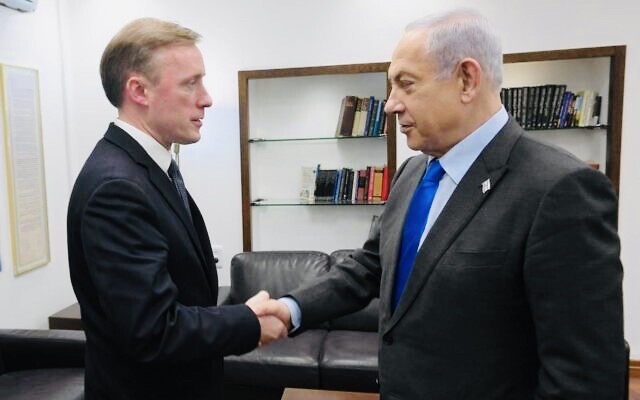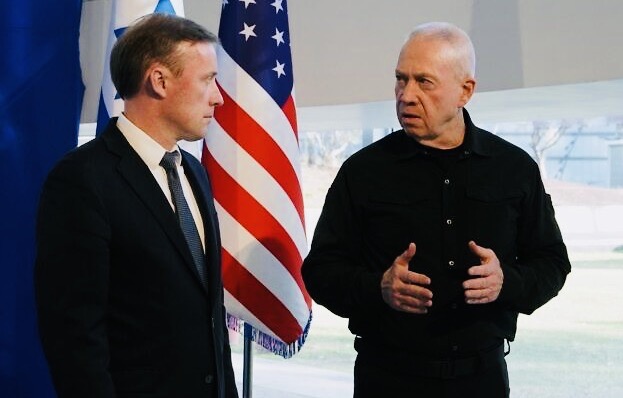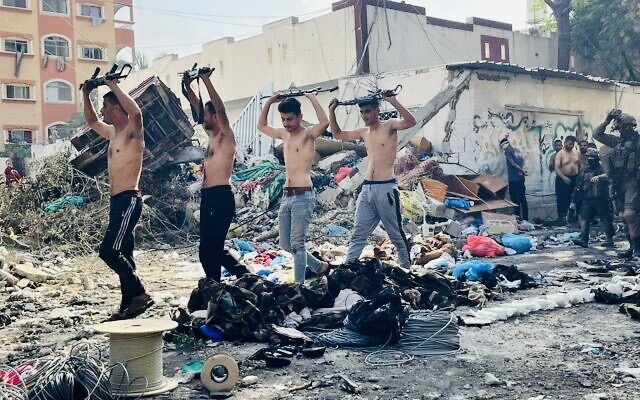The clock is ticking ever more loudly.
Israel is under increasing international and U.S. pressure to scale down its land and air offensive in the Gaza Strip. But the Israeli government insists that it will press on relentlessly until Hamas is categorically defeated, no longer poses a threat to its security, and is removed as Gaza’s governing authority.
Jake Sullivan, U.S. President Joe Biden’s national security advisor, spent two days in Israel from December 14 to ascertain what the length of Israel’s current military operation in Gaza will be and how Israel intends to conduct it.
Nearly 19,000 Palestinians, including about 7,000 Hamas and Islamic Jihad combatants, have been killed since the start of the fifth cross-border Gaza war, which has so far claimed the lives of 116 Israeli soldiers.
A few days ago, Biden, normally a steadfast supporter of Israel, accused Israel of subjecting Gaza to “indiscriminate bombing,” a harsh comment that one of his spokesman, John Kirby, subsequently walked back.
In addition, 85 percent of Gaza’s population of 2.2 million has been displaced by the fighting, creating a humanitarian crisis for which Israel has been blamed, even though Hamas operates from civilian infrastructure and uses civilians as human shields
Sullivan arrived in Israel several days after the United Nations General Assembly passed a non-binding resolution demanding an immediate ceasefire to ease the plight of Palestinians and allow the flow of basic goods into Gaza. Only 10 countries, including Israel and the United States, voted against the motion.
The Israeli Air Force launched a fierce bombing campaign in Gaza after some 3,000 heavily-armed Hamas terrorists broke through the high-tech border fence on October 7, in what was regarded as a colossal intelligence and military failure, and proceeded to murder 1,200 Israelis and foreigners in southern Israel.

On October 27, Israel invaded the coastal enclave, focusing first on attacking Hamas positions in the north. On December 1, following a short-lived truce during which some Israeli and foreign hostages were released by Hamas in exchange for allowing yet more supplies into Gaza, Israel resumed the war with a vengeance.
The United States, Israel’s chief ally, has provided Israel with military and political support. But amid global calls for a ceasefire and unease in the U.S. about the mounting Palestinian civilian death toll, the Biden administration has asked Israel to transition to a more targeted operation which would enable the Israeli army to find and kill Hamas leaders, destroy Hamas’ network of tunnels and rescue hostages.
To date, 105 hostages have been released. One hundred and thirty two remain in captivity, though several may be dead. Israel has recovered the bodies of eight hostages. Today, Israel announced that three hostages who had apparently escaped had been accidentally killed by Israeli troops.
Biden, in one of his strongest statements regarding Israeli tactics, said on December 14, “I want them to be more focused on how to save civilian lives, not stop going after Hamas, but be more careful.”
Prime Minister Benjamin Netanyahu and Foreign Minister Eli Cohen have both insisted that the war will go on until Israel’s objectives are met.

“We are continuing until the end, until victory, until the elimination of Hamas,” even in the face of international pressure, said Netanyahu a day prior to Sullivan’s visit. “Nothing will stop us. Let there be no doubt on this matter.”
Cohen was just as emphatic, saying the war would be prosecuted “with or without international support.”
Speaking to Sullivan on his first day in Israel, Defence Minister Yoav Gallant left an identical message. As he said, “Hamas is a terrorist organization that built itself over a decade to fight Israel. They built infrastructure under the ground and above the ground, and it is not easy to destroy them. It will require a period of time.” Gallant said that this phase “will last more than several months, but we will win and we will destroy” Hamas.

The head of Israeli military intelligence, General Aharon Haliva said that Israel “must continue to pressure the enemy, continue to kill the enemy, continue to destroy the enemy.” He added that the campaign has “multiple theaters and has months to go.”
Before Sullivan’s arrival, Channel 12, an Israeli television station, claimed that Netanyahu would present him with a timetable for gradually ending the war.
According to the report, the current phase of intense fighting in northern and southern Gaza will conclude by the end of January. Israel would then require several weeks to redeploy its defence lines in and adjacent to Gaza
During the third and longest stage, which would last for about a year, Israel would conduct localized raids and operations, with the aim of mopping up pockets of resistance and ending Hamas’ reign in Gaza once and for all.
Netanyahu has said that Israel will be in charge of security during this interregnum, but has no intention of reoccupying Gaza, from which it unilaterally withdrew in 2005.
A few members of his cabinet, however, have called for rebuilding Jewish settlements in Gaza. Today, Heritage Minister Amichai Eliyahu, a member of the far-right Jewish Power Party, advised Israel to “fully occupy” Gaza, claiming it would degenerate into a terrorist nest under Palestinian control. “Anyone who is selling the idea that (the Palestinians) can go back to running things doesn’t remember what happened on (October 7),” said Eliyahu, who last month stirred controversy when he called for striking Gaza with an atomic bomb.
Addressing the contentious issues on the table, Sullivan on December 15 played down differences between the United States and Israel. And he declined to publicly discuss a schedule for Israel’s withdrawal from Gaza.
As he put it at a press conference in Tel Aviv on December 15, “When Israel launched this campaign to root out the terrorist threat that Hamas poses to the state of Israel, it made clear from the beginning that this war would proceed in phases.”
Without delving into details, Sullivan said the next phase of the war would be more focused on intelligence-driven operations and targeting Hamas’s senior leadership from Yahya Sinwar on down.
“There’s no contradiction between saying the fight is going to take months and also saying that different phases will take place at different times over those months, including the transition from the high-intensity operations to more targeted operations,” he said.
Whatever the case may be, Israel should expect fierce resistance from the enemy, despite the fact that a small number of Hamas gunmen have surrendered.

Hamas is deeply embedded in strongholds like Gaza City, the suburb of Shejaija, Khan Younis and the Jabaliya refugee camp, and is capable of staging costly ambushes. Earlier this week, seven Israeli troops, including two senior commanders, were killed in such an attack.
Hamas is far from beaten after more than two months of war.
Yesterday, its spokesman in Lebanon said that Hamas fighters have enough weapons, munitions, food and water for the next few months.
Israel should expect nothing less than a grinding war in Gaza.
